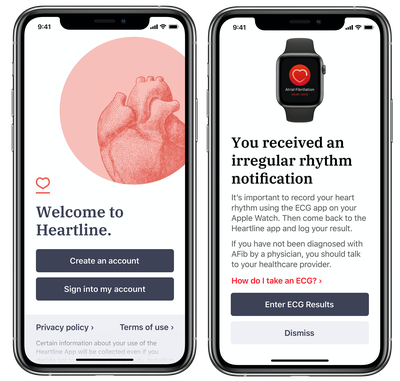Apple Working With Johnson & Johnson on 'Heartline Study' Aimed at Reducing Risk of Stroke
Apple and Johnson & Johnson today announced a new study that aims to gather more information surrounding atrial fibrillation and other conditions tracked by iPhone and Apple Watch. The "Heartline Study" will include an iPhone app, and explores whether health tracking features of iPhone and heart health features on Apple Watch can improve health outcomes.

The study is specifically aimed at individuals over 65 years of age. Apple and Johnson & Johnson are looking to see if Apple's health tracking technology can help reduce the risk of stroke thanks to earlier detection of atrial fibrillation, which is a leading cause of stroke in the United States and detectable with the Apple Watch's ECG feature.
The main issue with atrial fibrillation is that it is difficult to diagnose, due to the lack of physical symptoms in most patients. With Apple Watch, watchOS can alert users to a potential AFib event even if they are unaware of what's happening to them.
"Apple technology is making a meaningful impact on scientific research through the powerful capabilities of iPhone and Apple Watch, all with privacy at the center of the participant experience," said Myoung Cha, Apple's Head of Health Strategic Initiatives. "The Heartline Study will help further understanding of how our technology could both contribute to science and help improve health outcomes, including reducing the risk of stroke."
Those interested in the study must be 65 or older, a U.S. resident for the duration of the study, have traditional Medicare, own an iPhone 6s or later (with iOS 12.2 or later), and agree to provide access to their Medicare claims data. Once randomized participants are selected, they will be divided into two groups: one will only use the iPhone app and the other will use the iPhone app in addition to obtaining an Apple Watch. The study will last three years.
Apple and its devices regularly participate in scientific studies, most recently at Stanford Medicine with the "Apple Heart Study." This study began in 2017, and in November 2019 Stanford Medicine published results that ultimately determined the Apple Watch can successfully detect atrial fibrillation.
Popular Stories
Since the iPhone X in 2017, all of Apple's highest-end iPhone models have featured either stainless steel or titanium frames, but it has now been rumored that this design decision will be coming to an end with the iPhone 17 Pro models later this year.
In a post on Chinese social media platform Weibo today, the account Instant Digital said that the iPhone 17 Pro models will have an aluminum...
Apple is continuing to refine and update iOS 26, and beta three features smaller changes than we saw in beta 2, plus further tweaks to the Liquid Glass design. Apple is gearing up for the next phase of beta testing, and the company has promised that a public beta is set to come out in July.
Transparency
In some apps like Apple Music, Podcasts, and the App Store, Apple has toned down the...
In select U.S. states, residents can add their driver's license or state ID to the Wallet app on the iPhone and Apple Watch, providing a convenient and contactless way to display proof of identity or age at select airports and businesses, and in select apps.
Unfortunately, this feature continues to roll out very slowly since it was announced in 2021, with only nine U.S. states, Puerto Rico,...
Apple will launch its new iPhone 17 series in two months, and the iPhone 17 Pro models are expected to get a new design for the rear casing and the camera area. But more significant changes to the lineup are not expected until next year, when the iPhone 18 models arrive.
If you're thinking of trading in your iPhone for this year's latest, consider the following features rumored to be coming...
Apple is expanding the ability to add an Apple Account Card to the Wallet app to more countries, according to backend Apple Pay changes.
With iOS 15.5, Apple updated the Wallet app to allow users to add an Apple Account Card, which displays the Apple credit balance associated with an Apple ID.
If you receive an Apple gift card, for example, it is added to an Apple Account that is also...
Three out of four iPhone 17 models will feature more RAM than the equivalent iPhone 16 models, according to a new leak that aligns with previous rumors.
The all-new iPhone 17 Air, the iPhone 17 Pro, and the iPhone 17 Pro Max will each be equipped with 12GB of RAM, according to Fixed Focus Digital, an account with more than two million followers on Chinese social media platform Weibo. The...
Apple should unveil the iPhone 17 series in September, and there might be one bigger difference between the Pro and Pro Max models this year.
As always, the Pro Max model will be larger than the Pro model:iPhone 17 Pro: 6.3-inch display
iPhone 17 Pro Max: 6.9-inch displayGiven the Pro Max is physically larger than the Pro, it has more internal space, allowing for a larger battery and...
The calendar has turned to July, meaning that 2025 is now more than half over. And while the summer months are often quiet for Apple, the company still has more than a dozen products coming later this year, according to rumors.
Below, we have outlined at least 15 new Apple products that are expected to launch later this year, along with key rumored features for each.
iPhone 17 Series
iPho...




















